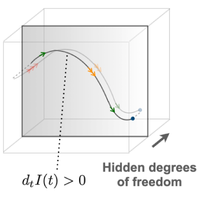当前位置:
X-MOL 学术
›
Phys. Rev. X
›
论文详情
Our official English website, www.x-mol.net, welcomes your feedback! (Note: you will need to create a separate account there.)
Stochastic Time Evolution, Information Geometry, and the Cramér-Rao Bound
Physical Review X ( IF 12.5 ) Pub Date : 2020-06-15 , DOI: 10.1103/physrevx.10.021056 Sosuke Ito , Andreas Dechant
Physical Review X ( IF 12.5 ) Pub Date : 2020-06-15 , DOI: 10.1103/physrevx.10.021056 Sosuke Ito , Andreas Dechant

|
We investigate the connection between the time evolution of averages of stochastic quantities and the Fisher information and its induced statistical length. As a consequence of the Cramér-Rao bound, we find that the rate of change of the average of any observable is bounded from above by its variance times the temporal Fisher information. As a consequence of this bound, we obtain a speed limit on the evolution of stochastic observables: Changing the average of an observable requires a minimum amount of time given by the change in the average squared, divided by the fluctuations of the observable times the thermodynamic cost of the transformation. In particular, for relaxation dynamics, which do not depend on time explicitly, we show that the Fisher information is a monotonically decreasing function of time and that the minimal required time is determined by the initial preparation of the system. We further show that the monotonicity of the Fisher information can be used to detect hidden variables in the system and demonstrate our findings for simple examples of continuous and discrete random processes.
中文翻译:

随机时间演化,信息几何和克拉姆-饶边界
我们调查了随机数量平均时间演变与Fisher信息及其诱发的统计长度之间的联系。由于Cramér-Rao边界的结果,我们发现任何可观测值的平均值的变化率从上方受其方差乘以时间Fisher信息的约束。由于这种限制,我们获得了随机可观察物演化的速度限制:更改可观察物的平均值需要最小时间,该时间由平均值平方的变化除以可观察物的波动乘以热力学得出转换成本。尤其是对于松弛动力学(不显式依赖时间),我们表明,Fisher信息是时间的单调递减函数,而所需的最小时间由系统的初始准备决定。我们进一步表明,Fisher信息的单调性可用于检测系统中的隐藏变量,并证明我们对于连续和离散随机过程的简单示例的发现。
更新日期:2020-06-15
中文翻译:

随机时间演化,信息几何和克拉姆-饶边界
我们调查了随机数量平均时间演变与Fisher信息及其诱发的统计长度之间的联系。由于Cramér-Rao边界的结果,我们发现任何可观测值的平均值的变化率从上方受其方差乘以时间Fisher信息的约束。由于这种限制,我们获得了随机可观察物演化的速度限制:更改可观察物的平均值需要最小时间,该时间由平均值平方的变化除以可观察物的波动乘以热力学得出转换成本。尤其是对于松弛动力学(不显式依赖时间),我们表明,Fisher信息是时间的单调递减函数,而所需的最小时间由系统的初始准备决定。我们进一步表明,Fisher信息的单调性可用于检测系统中的隐藏变量,并证明我们对于连续和离散随机过程的简单示例的发现。



























 京公网安备 11010802027423号
京公网安备 11010802027423号